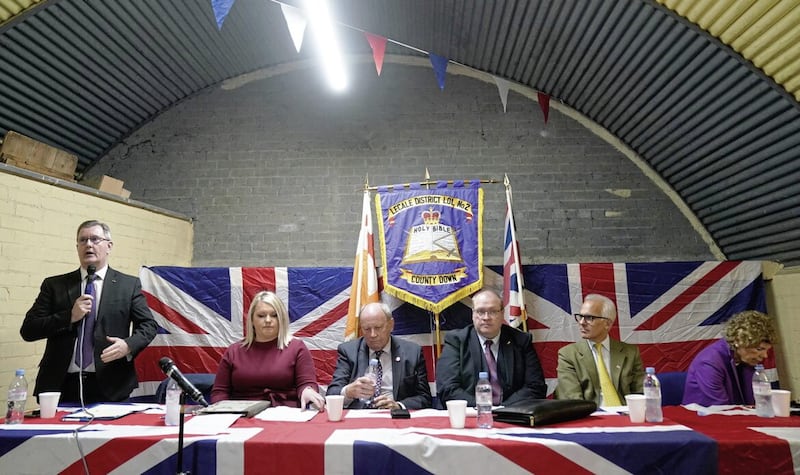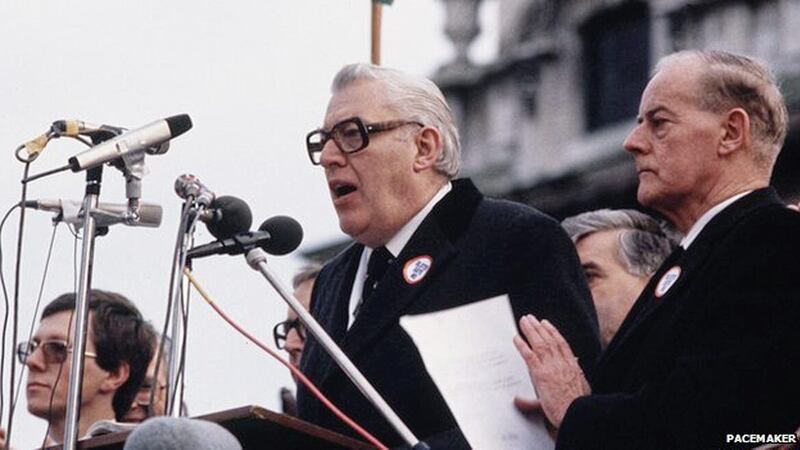ON November 26 1985 I had a chat with Jim Molyneaux, leader of the UUP. He was preparing for a debate in the Commons the following day and a vote which he described to me as the most important of his political career.
Margaret Thatcher was putting the Anglo-Irish Agreement forward for parliamentary approval and Molyneaux was desperate to stoke a huge rebellion from within the Conservative ranks.
I don’t think he was predicting defeat for her – she had the support of the opposition parties mostly in the bag – but he wanted her weakened and slowed down.
Maybe he believed that a humiliation for her would force her back to the negotiating table. Enoch Powell had been quietly briefing some key figures in the UUP that there was anger on the backbenches and believed that a big rebellion was possible.
It never happened. On November 27 the House approved the Anglo-Irish Agreement by 473 votes to 47. ‘Ulster’ unionism – and not for the first time – realised that it carried little real clout at Westminster. Fair enough, Molyneaux, Harold McCusker and other unionist MPs had very good personal relationships across the House and Powell was still a revered figure for a section of the Conservative party. But none of that mattered. There wasn’t enough personal, individual emotional attachment to unionism to persuade members that a rebellion was justified.
The DUP found itself – again, not for the first time – in a very similar situation on Wednesday afternoon. Jeffrey Donaldson had warned the ERG, in a private meeting, that his party would not restore power-sharing on the basis of what was in the Windsor Framework.
In his contribution to the Stormont brake debate he repeated his warning. It didn’t matter. Not enough people cared. There was still no emotional attachment, but this time there was very little political/constitutional attachment either. In a figure very similar to that of November 1985, the Stormont Brake was supported by 515 votes to 29.
Even more troubling for the DUP was that most of the “several dozen” members (according to its deputy chair) of the ERG didn’t rally to its side. No surprise there, to be honest, because 99.9 per cent of their much bigger membership in 2019/20 voted for the NI Protocol.
Like Sunak, most of them just want Brexit in the rear-view mirror and an end to the rehearsed outrages of Bill Cash and John Redwood, still trying to exact revenge for having been done over by John Major in 1993.
Donaldson may have believed that refusing to reboot the assembly was a big enough threat to damage Sunak: but it was never going to be. Writing in last week’s column I noted: "There are unionists and loyalists who believe that Sunak is still biddable because, or so they reckon, preserving the assembly is a priority for him.
"But is it? If he had to choose between the Windsor Framework and the DUP returning to the assembly and executive, which one is he likely to plump for?"
That question was answered on Wednesday.
I’ve also been arguing – for months, as it happens – that a new UK/EU deal would push unionists from the 'protocol or not protocol' question to the much more difficult 'devolution or direct rule' question.
If, as seems to be the case, the framework will be implemented and all routes to renegotiation blocked, what does political/electoral unionism do? How long does it sit outside while trying to find a way of returning? How long does it wait until it realises that no-one is riding to its rescue? How long does it wait until it realises that a UK government will rewrite the rules and state that, "a party choosing to exclude itself from the executive will, no longer, prevent the other parties from forming an executive"? How long does it wait until it realises that this is 1985 all over again?
When every legal and parliamentary route has been exhausted you really do have to ask yourself a simple question: how do you extract yourself from a ‘predicament’ into which a Supreme Court and sovereign parliament have forced you?
Mind you, the answer to that question is complicated by the fact that a large section of unionism (although not the majority, I think) doesn’t want to return to an assembly with a Sinn Féin first minister; and another large section (which probably is the majority) doesn’t want direct rule from a parliament which seems to be a repeat offender when it comes to undermining unionist interests.

The UUP, in a statement after the parliamentary vote – “the UK government is moving on and the DUP boycott has failed” – favours rebooting the assembly. The DUP’s panel is due to deliver its assessment in the next few days – and I still think it will be a softish landing. It’s going to be a few long and confusing weeks of blast and counterblast: and that’s just from the unionist side.








